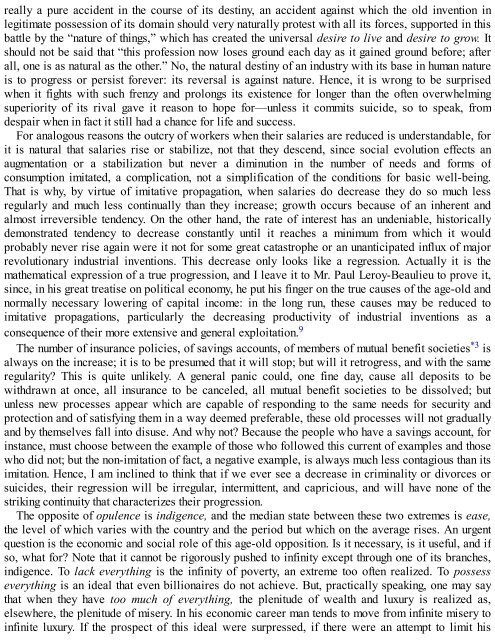3658925934
You also want an ePaper? Increase the reach of your titles
YUMPU automatically turns print PDFs into web optimized ePapers that Google loves.
eally a pure accident in the course of its destiny, an accident against which the old invention in<br />
legitimate possession of its domain should very naturally protest with all its forces, supported in this<br />
battle by the “nature of things,” which has created the universal desire to live and desire to grow. It<br />
should not be said that “this profession now loses ground each day as it gained ground before; after<br />
all, one is as natural as the other.” No, the natural destiny of an industry with its base in human nature<br />
is to progress or persist forever: its reversal is against nature. Hence, it is wrong to be surprised<br />
when it fights with such frenzy and prolongs its existence for longer than the often overwhelming<br />
superiority of its rival gave it reason to hope for—unless it commits suicide, so to speak, from<br />
despair when in fact it still had a chance for life and success.<br />
For analogous reasons the outcry of workers when their salaries are reduced is understandable, for<br />
it is natural that salaries rise or stabilize, not that they descend, since social evolution effects an<br />
augmentation or a stabilization but never a diminution in the number of needs and forms of<br />
consumption imitated, a complication, not a simplification of the conditions for basic well-being.<br />
That is why, by virtue of imitative propagation, when salaries do decrease they do so much less<br />
regularly and much less continually than they increase; growth occurs because of an inherent and<br />
almost irreversible tendency. On the other hand, the rate of interest has an undeniable, historically<br />
demonstrated tendency to decrease constantly until it reaches a minimum from which it would<br />
probably never rise again were it not for some great catastrophe or an unanticipated influx of major<br />
revolutionary industrial inventions. This decrease only looks like a regression. Actually it is the<br />
mathematical expression of a true progression, and I leave it to Mr. Paul Leroy-Beaulieu to prove it,<br />
since, in his great treatise on political economy, he put his finger on the true causes of the age-old and<br />
normally necessary lowering of capital income: in the long run, these causes may be reduced to<br />
imitative propagations, particularly the decreasing productivity of industrial inventions as a<br />
consequence of their more extensive and general exploitation. 9<br />
The number of insurance policies, of savings accounts, of members of mutual benefit societies *3 is<br />
always on the increase; it is to be presumed that it will stop; but will it retrogress, and with the same<br />
regularity? This is quite unlikely. A general panic could, one fine day, cause all deposits to be<br />
withdrawn at once, all insurance to be canceled, all mutual benefit societies to be dissolved; but<br />
unless new processes appear which are capable of responding to the same needs for security and<br />
protection and of satisfying them in a way deemed preferable, these old processes will not gradually<br />
and by themselves fall into disuse. And why not? Because the people who have a savings account, for<br />
instance, must choose between the example of those who followed this current of examples and those<br />
who did not; but the non-imitation of fact, a negative example, is always much less contagious than its<br />
imitation. Hence, I am inclined to think that if we ever see a decrease in criminality or divorces or<br />
suicides, their regression will be irregular, intermittent, and capricious, and will have none of the<br />
striking continuity that characterizes their progression.<br />
The opposite of opulence is indigence, and the median state between these two extremes is ease,<br />
the level of which varies with the country and the period but which on the average rises. An urgent<br />
question is the economic and social role of this age-old opposition. Is it necessary, is it useful, and if<br />
so, what for? Note that it cannot be rigorously pushed to infinity except through one of its branches,<br />
indigence. To lack everything is the infinity of poverty, an extreme too often realized. To possess<br />
everything is an ideal that even billionaires do not achieve. But, practically speaking, one may say<br />
that when they have too much of everything, the plenitude of wealth and luxury is realized as,<br />
elsewhere, the plenitude of misery. In his economic career man tends to move from infinite misery to<br />
infinite luxury. If the prospect of this ideal were surpressed, if there were an attempt to limit his









![Genki - An Integrated Course in Elementary Japanese II [Second Edition] (2011), WITH PDF BOOKMARKS!](https://img.yumpu.com/58322134/1/180x260/genki-an-integrated-course-in-elementary-japanese-ii-second-edition-2011-with-pdf-bookmarks.jpg?quality=85)
![Genki - An Integrated Course in Elementary Japanese I [Second Edition] (2011), WITH PDF BOOKMARKS!](https://img.yumpu.com/58322120/1/182x260/genki-an-integrated-course-in-elementary-japanese-i-second-edition-2011-with-pdf-bookmarks.jpg?quality=85)





